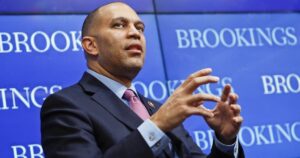Trump unaware of 'Shylock' as offensive term after rally remark
President Trump has once again stirred the pot with a single word that’s got the progressive crowd clutching their pearls.
During a high-energy rally in Iowa, Trump dropped the term “Shylock” while touting his latest legislative win, only to later claim he had no clue about its historical baggage, the New York Post reported.
At the Iowa State Fairgrounds in Des Moines, during his “Salute to America Celebration” marking the kickoff of yearlong festivities for America’s 250th anniversary in 2026, Trump used the term while discussing tax benefits tied to his One Big Beautiful Bill Act, a signature achievement of his second term.
Speaking at the rally on Thursday, Trump celebrated the recent House passage of the bill, dedicating much of his speech to its promises of financial relief for American families. “No death tax. No going to the banks and borrowing from, in some cases, Shylocks and bad people,” he declared, linking the term to predatory lending practices. Well, that’s one way to paint a picture, but it’s a brushstroke that’s landed him in hot water.
Historical Context Fuels Fierce Backlash
For those not up on their Shakespeare, “Shylock” comes from “The Merchant of Venice,” where it names a moneylender character often portrayed as greedy and vengeful, demanding a literal “pound of flesh” if a debt isn’t paid. This depiction has long been tied to harmful stereotypes about Jewish people, making the term a lightning rod for accusations of antisemitism.
Critics pounced faster than a cat on a laser pointer. Senate Minority Leader Chuck Schumer took to X, writing, “This is antisemitic. Plain and simple.” Talk about a rush to judgment—couldn’t there be room for misunderstanding here, Senator?
The Anti-Defamation League also chimed in on X, stating, “The term ‘Shylock’ evokes a centuries-old antisemitic trope about Jews and greed that is extremely offensive and dangerous.” They didn’t stop there, adding that Trump’s usage was “very troubling and irresponsible.” Strong words, but let’s not forget that intent matters just as much as impact in a fair discussion.
Trump Responds to Mounting Criticism
By Friday, after returning to the White House, Trump faced reporters and doubled down on his innocence regarding the term’s connotations. “I’ve never heard it that way,” he insisted, explaining his view of “Shylock” as merely a reference to high-rate moneylenders. Sounds like a classic case of speaking before Googling—turns out, that words carry weight beyond their dictionary definition.
Trump reiterated his stance to the press, saying, “I’ve never heard that.” It’s a simple defense, but one that raises eyebrows when history shows even past leaders like Joe Biden had to apologize for using the same term over a decade ago while criticizing exploitative financiers. If Biden knew better back then, shouldn’t we expect a bit more awareness now?
Still, let’s not ignore the broader context of Trump’s record. His administration has maintained strong ties with Israel, from recognizing Jerusalem as its capital to supporting actions against Iran’s nuclear ambitions just last month. Painting him as antisemitic over one word seems like a stretch when his policies tell a different story.
Rally Marks Return to Key State
The Iowa rally wasn’t just about this controversy—it marked Trump’s return to a pivotal primary state, where he fired up supporters with talk of economic relief. The One Big Beautiful Bill Act, now through the House, promises to be a cornerstone of his second term, and Trump made sure every attendee knew it. This wasn’t a slip-up in a vacuum; it was a moment in a much bigger celebration.
Yet, the “Shylock” comment has overshadowed what should’ve been a victory lap. Critics like Schumer and the ADL argue it perpetuates dangerous stereotypes, and they’re not wrong to point out the term’s ugly history.
But is it fair to assume malice when Trump’s own explanation suggests a blind spot rather than a vendetta?
Balancing Intent and Impact Fairly
Trump’s defenders might argue this is another overblown reaction from a hyper-sensitive culture that’s quick to cry “offensive” at every turn. After all, if he genuinely didn’t know the term’s baggage, shouldn’t we cut some slack? Or does ignorance stop being an excuse at a certain level of power?
At the end of the day, this episode reminds us that language is a minefield, and even well-meaning folks can step on a big one.
Trump’s Iowa rally should’ve been about rallying the base for a major legislative win, not debating Elizabethan slurs. Let’s hope this serves as a lesson in choosing words wisely—because, turns out, a single misstep can steal the spotlight from a hard-fought victory.




